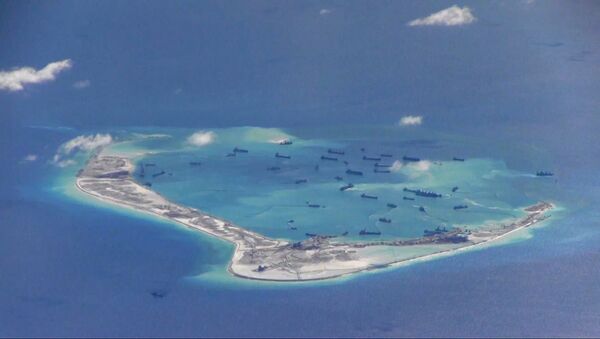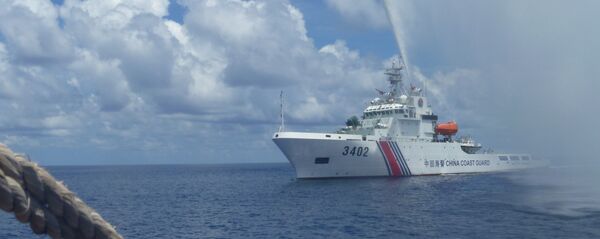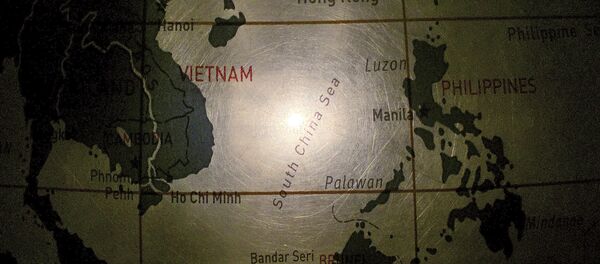The ruling of the Hague-based Permanent Court of Arbitration's on the South China Sea issue is by no means an end to the dispute, but "it could be the beginning to an end," managing editor for Veterans Today Jim W. Dean writes in his latest article for New Eastern Outlook online magazine.
The journalist believes that Beijing and its neighbors will find a mutually beneficial solution to their maritime dispute, adding that it is especially important in the light of the China-led New Silk Road initiative.
"I predict that China and its competing neighbors will eventually come up with some formula for sharing the South China Sea to varying degrees, and with many layers to it… Energy resources could be shared on a proximity formula that also gives weight to the population size of the competing countries, a socialistic 'need' twist that would be hard for China to reject. The broad development of resources in the area would stimulate economic growth, and especially consumer earnings and spending, which are critical in supporting a solid middle class lifestyle for all of the ASEAN countries," Dean underscores.
Dean calls attention to the fact the US is "using the South China Sea controversy to ensure future friendly attitudes for US basing rights in the region." Washington needs to maintain strategic control over South China Sea shipping lanes to preserves its dominance in the Asia Pacific.
"[Washington's] Asia Pivot is not so much a trade war as it is a banking war. The banksters are not about to give up their stranglehold monopoly on getting a piece of the financial action out of all major trade deals, and the huge ongoing annuity that represents," the journalist explains.
In his interview with Sputnik Fyodor Lukyanov, Editor-in-Chief of Russia in Global Affairs and Research Director at the Valdai International Discussion Club, suggested that Washington aims to provoke China into taking harsh actions in the region, referring to the possibility of establishing an air defense identification zone (ADIZ) over the South China Sea by Beijing.
The Asia-Pacific region may turn into a hornet's nest, prompting the regional players to seek Washington's assistance, Lukyanov noted.
Thus far, The Hague ruling may allow Washington to win points in its longstanding geopolitical game with Beijing in East Asia.
On April 18, 2016 Foreign Ministers of the Russian Federation, the Republic of India and the People's Republic of China released a joint communiqué on the matter:
"Russia, India and China are committed to maintaining a legal order for the seas and oceans based on the principles of international law, as reflected notably in the UN Convention on the Law of Sea (UNCLOS). All related disputes should be addressed through negotiations and agreements between the parties concerned. In this regard the Ministers called for full respect of all provisions of UNCLOS, as well as the Declaration on the Conduct of Parties in the South China Sea (DOC) and the Guidelines for the implementation of the DOC," the communiqué read.
In response to The Hague ruling Beijing signaled that it regards the ruling "null and void," with "no binding force."
In contrast to the media's "forecast," China has demonstrated its commitment to solve the dispute through diplomatic means.
Xinhua reported Saturday that Chinese Premier Li Keqiang made his first statement regarding The Hague ruling this weekend at the 11th Asian-Europe Meeting (ASEM) Summit.
Li underscored that China has never participated in the arbitration "unilaterally initiated by the Philippines." He stressed that Beijing "neither accepts nor acknowledges the so-called arbitration award."
"By doing so, we are both exercising our rights in accordance with international law, and safeguarding the dignity of international law," Li stated, as quoted by the media outlet, adding that China remains committed to settling the South China Sea disputes "via dialogue and consultation with countries directly involved" in line with historical facts, international law and the Conduct of Parties in the South China Sea (DOC).
The media outlet underscored that Beijing's position on the issue received respect and support from prime ministers of Vietnam, Laos and Cambodia, who agreed that the dispute should be solved via consultations between parties directly concerned.
Before beating the drum over the South China Sea ruling Washington should take a walk down the memory lane, Dean writes, referring to the 1986 International Court of Justice (ICJ) decision on the case of Republic of Nicaragua vs The United States of America.
The ICJ ruled that the US violated international law by supporting the Contra rebels against the Nicaraguan government and awarded reparations to Nicaragua.
In response "the US exited the International Court of Justice proceeding and began a publicity campaign to disparage the court," Dean notes, blasting Washington for its double-standard approach.




